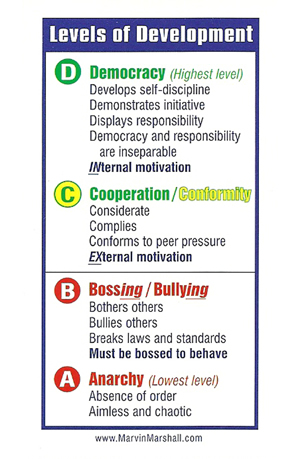If you’re looking for some discipline help so you can increase motivation, responsibility, and learning in young people, then stay away from the following 10 counterproductive discipline approaches.
- BEING REACTIVE
Teachers too often become stressed by reacting to inappropriate behavior. It is far more effective to employ a proactive approach at the outset to inspire students to want to behave responsibly and then use a non-adversarial response whenever they do not.
- RELIANCE ON RULES
Rules are meant to control, not inspire. Rules are necessary in games but when used between people, enforcement of rules automatically creates adversarial relationships. A more effective approach is to teach procedures and inspire responsible behavior through expectations and reflection.
- AIMING AT OBEDIENCE
Obedience does not … >>>
READ MORE >>> →





